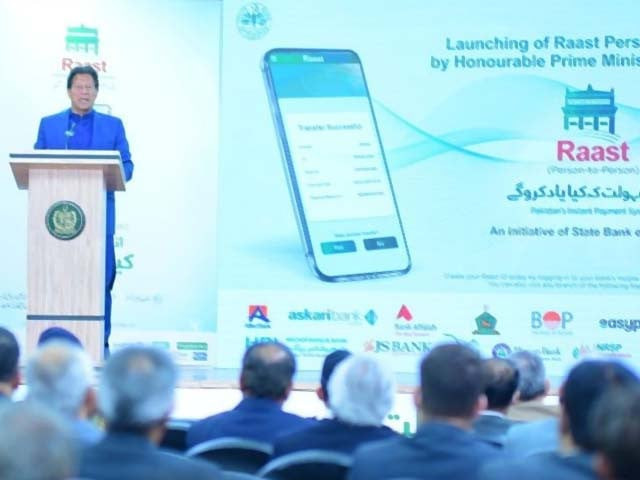Pakistan is finally embracing digital finance after witnessing its benefits over the last two years, when coronavirus cases were rising exponentially and paper money became a medium through which infections began spreading. During this time, the State Bank of Pakistan (SBP) removed charges from interbank fund transfers (IBFTs) in order to encourage Pakistanis to use digital banking channels instead of paper money. This step by the SBP proved to be a success, demonstrating Pakistan’s appetite for digital finance. Following this success, the SBP has now launched its Raast programme, which is going to provide users with the ability to make payments instantly to one another at no cost and help facilitate free digital banking.
It could be argued that prior to the coronavirus pandemic in 2020, many Pakistani citizens were wary of digital payment and transfer systems, fearing that their money would be compromised while using online applications. However, fear of being infected by the virus, as well as aggressive steps taken by SBP over the last two years, have helped Pakistani citizens understand the technology and how it can help them save time and deal with their financial commitments in a secure manner. Hence, Pakistan has experienced a surge in digital banking in the past two years.
According to Karandaaz, a non-profit organisation working to improve financial inclusion (FI) in Pakistan, rapid adoption of mobile money had accelerated FI in Pakistan to 25% by late 2020, up from 21% before the pandemic began. Similarly, ownership of mobile money accounts rose from 9% to 16% during the same time period. Surprisingly, 11% of adults were using mobile money for the first time.
Furthermore, following the onset of the coronavirus pandemic in 2020, many Pakistanis shifted to e-commerce for the purchase of daily household necessities and luxury items. According to a Visa survey in 2020, 43% of in-store shoppers in Pakistan started shopping online. In addition to this, 55% of internet shopping had been paid for with a bank card rather than cash on delivery in 2020. These experiences demonstrated to the consumers that online transactions could be simple and secure. These developments also show unequivocally that Pakistani citizens can easily incorporate digital finance applications into their daily lives, and it is now up to government officials to seize this opportunity. As a result, the SBP’s Raast initiative is a step in the right direction.
In a nutshell, Raast is an instant payment system that facilitates free person-to-person (P2P) payments. Users will be able to receive and transfer funds in real time through their respective banks via internet banking, mobile apps or through over the counter transactions. SBP’s Raast programme aims to provide users with a simple and convenient digital payment system by linking their mobile phone numbers to their bank accounts. This service will help to eliminate the need for account numbers and bank names, which are typically required for interbank fund transfers.
Moving forward, Raast is expected to solve two critical problems that Pakistan is currently facing. For starters, it may focus on improving interoperability among banks, which means it may improve companies’ ability to benefit from data sharing. This will allow individual banks to learn from the mistakes of their peers and, hopefully, improve the overall consumer experience. Secondly, because the service is free for users, it will help to accelerate the adoption of digital finance applications in the country due to the lack of a monetary barrier, hence ensuring accessibility.
To encourage the use of Raast, the SBP has implemented a number of incentives aimed at luring in customers, such as directing banks to credit cash transferred through Raast to the recipient’s bank account within 20 seconds of the system receiving credit advice. Furthermore, the SBP does not charge banks any fees for this, hence allowing banks to provide these services at no cost to their customers. Moreover, and perhaps most importantly, banks are not required to set a minimum transaction amount. This is significant since usually the maximum transaction limit set by banks is typically PKR 200,000, and can be higher depending on the user’s risk profile.
The SBP has launched Raast with the best of intentions, and looking back over the last two years, there is no doubt that digital finance applications have significant growth potential in Pakistan. While a lack of existing digital framework does serve as a roadblock to the extent of Raast’s reach, one hopes that this programme can help usher in increased digital access across the country in the long run. Raast will help Pakistan lay a solid foundation for digital payments and transfers, and consumers may soon be able to live completely cashless lives. This transition will benefit the Pakistani economy by improving financial transaction documentation, allowing the country to make sound economic decisions, and enhance the much-needed tax revenue.



COMMENTS
Comments are moderated and generally will be posted if they are on-topic and not abusive.
For more information, please see our Comments FAQ